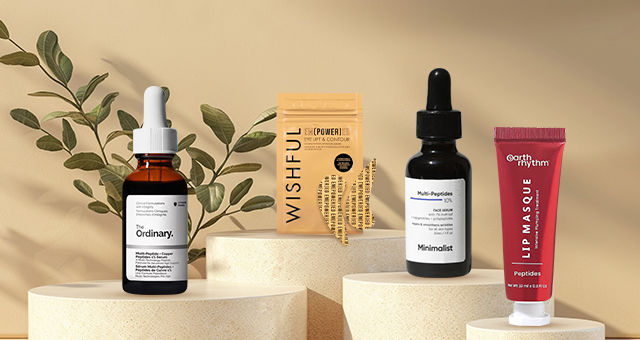
In This Story:
From Cleopatra taking milk baths every day to Spanish explorers seeking the ‘fountain of youth’ over generations, the desire to stop the clock has been very real and perseverant through the ages. Magic ingredients that claim to turn the signs of ageing have popped up as trends and fads over the course of history. Some have made it to the eternal shelves of beauty (we see you, coconut oil and bakuchiol), while some have faded out.
But with time and technology, scientists have confirmed that youthful-looking, plump skin is all about the production of collagen and elastin, plugged in with lots of hydration. As long as your skin has a well-balanced collagen production, premature signs of ageing won’t touch you. In fact, deep hydration along with ingredients that promote collagen production can even reverse some signs of ageing like fine lines, dullness, wrinkles, and dryness.
One such ingredient that helps stop or even reverse the clock is peptide. Peptides is not a new kid on the block, it’s been a part of our anti-ageing products for years, but lately, it’s been having a moment with beauty influencers and skincare enthusiasts opening and having a conversation about it. Let’s see what this magical ingredient is and how helpful it is for peptides for the skin. Along with that, we will explore the benefits, the usage, some top-notch product recommendations, and even side effects. So, without further ado, let’s see what peptides are.
What Are Peptides For Skin?
They are the building blocks of collagen and elastin - both the foundation of our skin. Peptides also known as Polypeptides are made of amino acid strings. But there is another thing in our bodies that is made of amino acid strings, yes, you guessed it right, protein. Peptides are much smaller than proteins but similar in composition. When applied topically, peptides amplify the production of collagen and elastin, making fine lines and wrinkles appear less and your skin bouncier.
In plain English, peptides for skin, can trigger our skin cells to produce more collagen and elastin. More collagen production means a firmer, stronger skin barrier that improves moisture retention capacity. This means your skin appears firm yet soft, hydrated yet tight and of course younger than before. But that’s not it, let’s look at the benefits of peptides for the skin.
8 Peptides Benefits
Here are peptide benefits, before you get to adding them to the cart.
-
Anti-Ageing Benefits
Peptides enable more collagen production, a very essential element in reducing fine lines and wrinkles. It increases the elasticity of the skin and tightens, this prevents your skin from crinkling and sagging thus reducing fine lines and wrinkles that make your skin appear older than it actually is.
-
Strengthens The Skin Barrier
If you have skin conditions such as acne, eczema, and rosacea or even a weak skin barrier, peptides can help strengthen them. Since peptides are small in size, they can penetrate your epidermis and keep your skin firm and intact from within.
-
Increases Collagen Production
Peptides enable more collagen production, a very essential element in reducing fine lines and wrinkles. It increases the elasticity of the skin and tightens, this prevents your skin from crinkling and sagging thus reducing fine lines and wrinkles that make your skin appear older than it actually is.
-
Adds Antioxidant Benefits
Peptide benefits also include antioxidant benefits. Since peptides contain antioxidants it helps your skin from environmental stressors such as dust, dirt, harmful UV rays, and pollutants. It also fights against free radicals that cause skin damage and photoaging.
-
Smoothens Skin Texture
Peptides also help smoothen uneven skin texture and skin tone. Collagen helps promote more transparent, healthier, and plumper skin that evens out any scars, divots, or dehydration.
-
Retains Moisture
As we grow older, our skin produces less and less collagen leading to wrinkly and dehydrated skin. This means a boost in collagen through peptides can not only add moisture but also lock it in, causing your skin to glow with hydration.
-
Improves Skin Elasticity
Peptides make the skin more firm and thus make it more elastic. Skin elasticity causes the skin to become bouncier, softer, plumper, and thus more healthy. Peptides are so good with skin elasticity, it is considered the poor man’s botox.
-
Helps Clear Breakouts
When your skin becomes extremely dehydrated, our oil glands work extra hard to produce sebum and oil to maintain the moisture levels, this can cause acne breakouts. However antimicrobial and hydrating properties in peptides control these breakouts, leaving you with healthier skin.
How Peptides Work On Skin
Peptides for skin are now among the most widely used and fashionable chemicals, appearing on store shelves in a variety of products like serums, moisturisers, creams, face cleansers, masks, and more. The optimal product for you will depend on your skin type, skin issues, and peptide usage.
Peptides work best when applied as a leave-on product, such as a moisturiser or serum, that your skin can absorb deeply to give it enough time to function as intended. The way peptides function is a little more intricate. Our bodies use peptides as enablers to begin the healing process by promoting the existing collagen production where it is most needed. For example, if you apply a peptide-infused serum, the skin cells will direct peptides to the most needed part of your face, for instance, if your chin and outer corners of the mouth have wrinkles and dryness, then peptides will focus their energies there, instead of the whole face.
Peptides also slow down the skin’s collagen barrier breakdown and instead increase the production of new collagen for targeted healing. When applied as a moisturiser, it tricks the skin into accepting the peptides as part of the skin chemistry.
How To Choose The Right Peptide For Skin Products
There are a few things to consider before choosing the right peptide for your skin. But these are the two more important factors.
-
Other Ingredients
Other ingredients such as niacinamide, hyaluronic acid, and antioxidants work really well since they help repair and hydrate your skin just like peptides. However active acids and ingredients such as AHAs can slow down the process of peptides since they are strong ingredients working on the issue they are meant for. Hence space out your skincare essentials if they have competing properties.
-
Product Strength
You can get peptide-infused products in the form of serums, moisturisers, face mists, toners, cleansers, face masks, lip balms, and more. Serums have a higher penetration property while a face cleanser only works for a few minutes, make sure to check how much concentration your skin needs and consider your choice then.
Side Effects Of Peptides
Although there aren’t a lot of side effects for topical peptides, since they are very close to our natural skin chemistry, the one thing that could affect your skin is an allergic reaction. If your skin is allergic to peptides, it can lead to breakouts, rashes, burns, and redness. We recommend conducting a patch test on your inner elbows or chest area to see how it reacts, especially if you have sensitive skin.
Best Peptide Products For Skin
Ready to dive into peptides? They might not be as lavish as Cleopatra’s baths, but they sure work well. Here’s a list of fabulous skincare formulas with peptides as their hero ingredients. Enjoy your way to timeless beauty!
Parting Thoughts
Peptides are great ingredients for your skin since they replicate your natural skin chemistry. The thin amino acid strings that work to boost collagen, retain moisture, and reduce fine lines are a miraculous substance to repair photoaged and mature skin. Incorporating a peptide-infused serum or face toner can significantly improve your skin's natural barrier and elasticity for healthier, softer skin.
FAQs
-
What is the difference between peptides and proteins?
Both peptides and proteins are made of strings of amino acids, but peptides are formed on only 10–20 strings while protein is made of over 100 strings, this makes peptides smaller in size and thus easier for the skin to absorb and real peptides benefit.
-
What are peptides?
Peptides are short strings of amino acids that are bound together by peptide bonds. These strings enter our skin to repair the skin barrier and reduce signs of ageing.
-
Recommend peptide lip balms.
Here are a few peptide lip balms:
-
Should I use a peptide serum or moisturiser?
You should use a serum or a moisturiser with peptides depending on your skin type and needs. If you have extremely dry skin and signs of ageing then you should use a serum, it is stronger and has a more targeted approach. If you have normal skin and new signs of ageing, then you can use a moisturiser or even a face mask.
-
Can I use a moisturiser after peptides?
Yes, if you have used a peptide-infused serum, face mask, or toner, you can use a moisturiser after to lock in the benefits and moisture.
